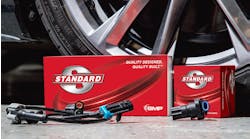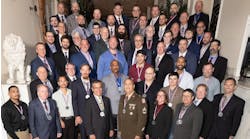A California Appellate Court rejected a body shop owner's claims of unfair business practices on the part of two major insurance companies in early January, upholding an earlier trial decision.
John Webster, owner of Gilroy, Calif.-based Johnny's Custom Autobody, had claimed that Allstate Insurance and Progressive Casualty Insurance's labor rate surveys result in unlawful steering and artificially low labor rates for repair work. The original complaint alleged collusion between the insurers and their direct repair program (DRP) body shop partners. Webster also claimed that including DRP shops in the insurer's labor rate surveys violated California's Unfair Competition Law (UCL). The lower court rulings were handed down in 2006 and 2007.
The appeals court concluded that since the body shop owner had not paid any money to the insurance companies, that he did not have standing to pursue a UCL claim. The court also found that insurer's DRP agreements were not in violation of the state's general anti-trust law, the Cartwright Act, and that "unjust enrichment" was not a proper cause of action under California law.
While the case is a setback for shops that were hoping to curtail what they see as insurer control of their labor rates, Allen Wood, executive director of the Collision Repair Association of California (CRA), believes this particular fight may not be over.
"This is a case that it would behoove the industry to take a look at," Wood says. "But you should take into consideration that this is not a published case. It's not something that can be referenced in other decisions."
Webster's attorneys are already planning their appeal to the California's Supreme Court. According to Doug Johnson of Beverly Hills-based firm Johnson & Johnson, they will appeal both the unjust enrichment and UCL violation rulings.
Under the concept of unjust enrichment, one party benefits at the expense of another. In the Webster case, the court held that unjust enrichment was not a cause of action under the UCL, and that even if it were, the shop owner did not meet the legal standard because if he believed the labor rates were unreasonable "he could have refused to provide his services to defendants' insureds and claimants."
"California law is split as to whether unjust enrichment is a cause of action," Johnson says. "This is a very ripe case for the Supreme Court to determine if this cause of action exists or not."
Body shops have also had some success on the labor rate front in other states. Last November in Connecticut, a jury ordered The Hartford Insurance Co. to pay $15 million to a group of auto body shops in a class action lawsuit that claimed Hartford was suppressing labor rates by eliminating the use of independent appraisers.
Labor rate controversy
While some states explicitly exclude DRP shops from labor rate surveys, California does not. In this case, Webster contended that by including the lower negotiated DRP rates in the surveys, the insurance companies were artificially lowering the prevailing labor rate and using those lower rates to steer business to DRP shops.
Labor rate surveys have long been an area of contention among repairers and insurers in California. The California Autobody Association (CAA) has been working with the Department of Insurance to change the way insurance companies conduct these surveys for several years. While the Department requires insurers to make their labor rate surveys available to the DOI, there are no specific rules as to how the surveys are conducted, or which shops are included. Other shops, and the CRA, have opposed codifying the surveys, because they fear such regulations would legitimize what they consider questionable data.
The plaintiff in this case had sought an injunction to prohibit the insurers from using negotiated rates in their surveys, and asking for treble damages for violations of the Cartwright Act.
The court found that the insurer's "alleged conduct does not constitute a violation of the letter or spirit of any constitutional, statutory or regulatory provision," and that they were not injurious to consumers.
As a shop owner, Webster is not considered a consumer of the insurance companies, and according to the decision, "as a result of [the insurance companies'] business practices, insured and claimants are charged a lower rate for auto body repairs."
The court also rejected the claims of a Cartwright Act violation because the insurance companies were not competing with the body shop for business. Webster had claimed that the insurance companies and their DRP shops had "entered into a price-fixing conspiracy to depress the price charged for auto body repairs."
The Webster case illustrates a major difficulty repairers have had in taking insurance companies to court over their labor rate practices – body shops are not considered customers or competitors of insurance companies, providing them little standing in most unfair business practices or anti-trust cases.
In the appellate decision, the court (citing a previous case) noted that rather than a "price-fixing" scheme, labor rates reflected a well-functioning market where DRP shops provided volume discounts. Other shops are free to charge higher labor rates, provided the market will bear those rates.
In practice, however, collision repair labor rates have remained artificially depressed and stagnant compared to mechanical repair labor rates in many markets.
Johnson believes that the unfair competition law allows his client to seek an injunction to keep insurers from continuing their current labor rate practices, even if the shop hasn't turned over any money to the insurance companies.
"Here's the problem: the insurance company comes in with the checkbook and interjects themselves into this transaction between the shop and their customer," Johnson says. "There should be a remedy. That's why we think the unjust enrichment claim fits perfectly. The shop is not under contract and not a customer of the insurance company, but something is happening here and it's not fair."
Other similar cases are currently winding their way through the California court system, and as Wood noted, the Webster case remains "unpublished" – meaning it can't currently be cited as case law in other decisions. Meanwhile, another group of shops in California (led by former CRA president Gene Crozat) plans to file a class action lawsuit against State Farm for its alleged steering practices.
Johnson expects the Supreme Court to accept or deny the Webster appeal within a few months, but it could take up to a year before there is a hearing.



